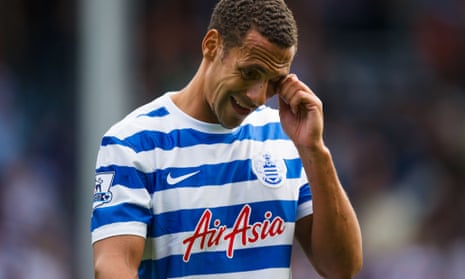Rio Ferdinand announced his retirement on Saturday, calling time on a 19-year career that was one of the finest in English football.
In a statement Ferdinand thanked all his managers but offered special praise for Sir Alex Ferguson. The 36-year-old described the Scot he played under for 11 of his 12 seasons at Manchester United as a genius – a leader who made him “a man” and helped him finish his career with six Premier League titles, the Champions League, three League Cups, the Uefa Super Cup and the Fifa Club World Cup.
Ferdinand made his debut for West Ham United in 1996. He joined Leeds United in a record move four years later, broke another record in moving to Manchester United in 2002 and finally joined Queens Park Rangers last summer. Ferdinand, who also had a two-month loan spell at Bournemouth that ended in January 1997, said: “I’d like to thank Chris Ramsey, Harry Redknapp, David O’Leary and David Moyes who managed me at various times in my career, all the backroom staff who looked after me over the years and the players I played with.
“Winning trophies at Manchester United allowed me to achieve everything that I desired in football. None of that would have been possible without the genius of one man, Sir Alex Ferguson. His greatest accomplishment in my eyes will always be how he developed us [at United] as men, not just as footballers. He will, in my opinion, always be the greatest manager in British football history.”
Ferdinand played 81 times for England and was in the squads for the 1998, 2002, 2006 and the 2010 World Cups – though was injured in training for the last of these and did not kick a ball in South Africa. Ferdinand was never selected for a European Championship, missing out on the 2004 finals in Portugal due to an eight-month ban for failing to take a drugs test in September 2003. This also caused his exclusion from United’s triumphant FA Cup final side of 2004, this competition being the sole major club trophy he did not claim.
“I will always regard the 81 times that I played for England with immense pride. These are all treasured memories that will last a lifetime,” Ferdinand said. “Starting a career, every young man needs mentors. I found mine in Dave Goodwin, the district manager at Blackheath, and Tony Carr, the youth team manager at West Ham. They installed in me personality traits that lasted throughout my career. I will always be grateful to them.”
Ferdinand lost his spouse, with whom he has three children, to cancer at the start of the month. “I’d also like to thank and pay tribute to my wife Rebecca and my family, including my mother and father, for their sacrifices, their encouragement and their advice throughout my career,” he said. “And finally I’d like to thank all the fans from all the clubs – for without them professional football would not exist. I will miss each and every one of you on my Saturday afternoons.”
Although the missed drugs test is a blemish on Ferdinand’s CV he was one of the few among his generation to take an active role in social issues while at the peak of his career. Ferdinand grew up on the tough Friary estate in south London’s Peckham and attended school with Stephen Lawrence, the teenager murdered in a racist attack in Eltham in 1993. Ten-year-old Damilola Taylor was stabbed to death in 2000 near his childhood home.
These experiences drove Ferdinand to strive to make a difference. In April 2007 Tony Blair made him an anti-gun and knives ambassador;he was also involved with the Damilola Taylor Trust and contributed to anti-racism, Aids awareness and child literacy campaigns. In 2003 Southwark Council unveiled a blue plaque on his estate to recognise this contribution.
Time spent in Ferdinand’s company revealed a personality curious about the wider world, which again derived from formative years that featured a wide range of experiences. He attended the Central School of Ballet in Clerkenwell, London, along with his younger brother, Anton. Celia Darker, his teacher, told the Guardian in 2012: “He was also a bit of an actor. I remember Rio having particularly long and perfect ballet legs so he could jump really high. He did really love it.”
Ferdinand’s loyalty to his Anton, who is also a successful footballer, was indicated during the alleged racism case involving John Terry and his brother in which the Chelsea captain was acquitted in July 2012, after that summer’s European Championships. Roy Hodgson failed to select Ferdinand for the tournament but did choose Terry.
Although the England manager insisted he did so for “footballing reasons”, a view formed that Ferdinand had been unfairly left out to defuse potential tensions at the finals.
Gary Neville, Ferdinand’s former United team-mate, was among those who paid tribute to him on Twitter. “Congratulations to @rioferdy5 on his great career. Best I played with and best pairings I’ve seen with Vida/JT” – a reference to Nemanja Vidic and Terry, with whom Ferdinand formed formidable central defensive partnerships for club and country.

Comments (…)
Sign in or create your Guardian account to join the discussion